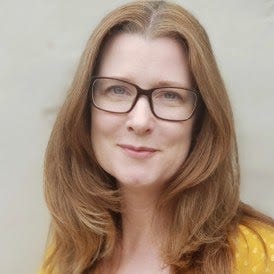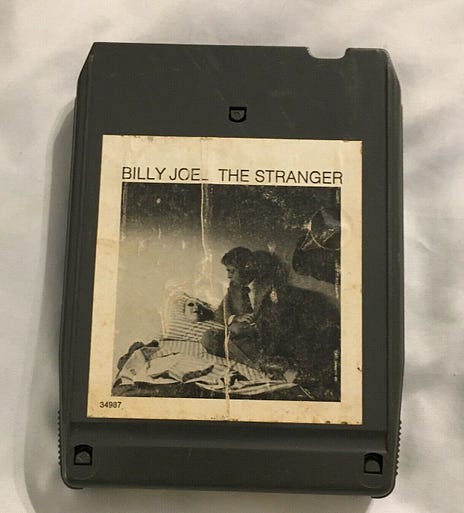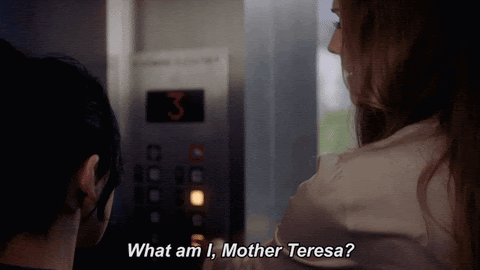Shuffle Synchronicities: Volume 1 - #200
Guest Post by Barrington Smith-Seetachitt + "Trampled Rose" by Tom Waits - 07/21/21
Today we have a very endearing post from a writer friend from USC film school, Barrington Smith-Seetachitt. Barrington and I kept in touch over the years, and besides her impressive professional writing, she also writes yearly personal newsletters that I’ve always found quite interesting.
Here’s a bio!
Barrington Smith-Seetachitt is a former Mid-westerner living in Los Angeles, where she writes for page and screen. Her stories have been published in journals and anthologies including Colorado Review, Chariton Review, and Women of Horror, Volume 3 and one of them recently won Screencraft's Cinematic Short Story Competition Grand Prize. Her screenplays have been awarded an Amazon Studios Best Screenplay prize and a DreamAgo fellowship. An episode she co-wrote for AMC Shudder'santhology series CREEPSHOW is coming out this season. You can sample her short fiction on her podcast, Words to Drive By, or read random thoughts about her life and updates on her projects on her blog at BarringtonSmith.com.
Without further adieu, take it away Barrington!
Thanks, Dave -- for the invite to write a guest post!
The song that came up for me was
“Pressure” by Billy Joel
BILLY JOEL
In an era before airbags, seatbelt laws and child-car-seats-built-like-padded-exo-skeletons, my father possessed an impressively modern, before-his-time anxiety about shit that could happen to his children on the roadways. When my sister and I went on combined-class field trips in grade school, he made our teachers put us on separate buses, so if one of his kids died, there’d still be one left. When he saw teenagers showing off in their small, sporty cars, he’d say, When you kids start driving, I want you in the biggest, heaviest car on the road so if you get into an accident with that idiot, you'll survive.
True to his word, when I turned 16, I was given use of a 1972 Buick Estate Wagon. If I had to launch myself into the world, at least I would do it encased in 5400 pounds of steel on top of a V-8 engine, so that if someone's coming up behind you you can get the hell out of there.
Not my car, but similar
Nineteen feet, tip to tail, wrapped in wood-grain veneer, my car could carry a dozen flexible teens if a night went that direction. It was equipped with a working A.C. and a state-of-the-art-two-decades-prior, 8-track cassette player. 8-tracks weren’t that easy to find. I had only one that I either inherited with the car, or picked up at a garage sale or thrift store.
It was Billy Joel's The Stranger.
Not my actual 8-track, but similar.
The Stranger was the lowkey soundtrack to my high school years in the Midwest. Not the Violent Femmes or INXS I listened to with my friends, but what played in a loop as I drove to social events, wrestling with my as-yet unnamed anxiety, or coming home on dark, lonely roads at night, praying not to get railroaded at the cusp of curfew.
I think, through sheer repetition, the songs on that album subtly shaped my worldview. “Only the Good Die Young,” made me realize that I, too, would rather laugh with the sinners than cry with the saints, and possibly influenced my decision not to be like those Catholic girls who start much too late. “Scenes from an Italian Restaurant” made me nostalgic for a life I hadn’t lived—and reinforced my plans not to get married straight out of high school. The melodic caution from “Vienna” echoed in my head, You know that if the truth is told, you can get what you want or you can just get old. I resolved that in my foggy future, I would make every effort to avoid that fate.
PRESSURE
The most synchronistic aspect of Joel’s song “Pressure” coming up in my (husband’s) Spotify is that for the last six weeks, I’ve had a book next to my bed called Performing Under Pressure: The Science of Doing Your Best When It Matters Most, by Hendrie Weisinger and J.P. Pawliw-Fry, a title that I ran across (another possible synchronicity?) while doing some research and writing for a client who’s a therapist, and was inspired to check out from the library.
From this book I’ve learned that pressure can be described as: a situation in which you perceive that something at stake is dependent on the outcome of your performance.
Stakes are integral to this definition, because stakes, according to Weisinger and Pawliw-Fry, are what delineates pressure from stress. They describe a pressure moment as: a stressful moment in which the consequences or results matter.
Their example is something like: if you have a lot of errands to run and traffic is bad and you’re running out of time to pick up clothes from the cleaners, you feel stressed. But since the consequences of not making it to the cleaners are not that dire, while it’s stressful, it’s not a pressure situation.
Reading that example, I immediately thought to myself: unless you’re picking up an outfit your boss wants to wear that night and failure to do so will lead to you getting fired. Or you’re picking up costumes they need on a set in the morning, whose absence will cause an entire cascade of production-related consequences.
While the authors reasonably assume their scenario doesn’t have big consequences, my default is to consider that it might. I’ve always figured this instinct was a trait I acquired during an early adulthood spent in Hollywood, on jobs where any task—from answering a phone, to ordering a gift basket to making a budget—might have ridiculously high stakes attached.
In writing this, however, it occurs to me that maybe I didn’t randomly end up in those environments, but was drawn to them—or chosen for them—because my sensibilities were, in fact, shaped much earlier. If, at age eleven, I didn’t find it that strange to weigh in possible death scenarios when planning a field trip to the science museum, what had I internalized before then?
When Billy Joel recorded The Stranger in 1977, it was in the wake of his 1976 album, Turnstiles, which had sold so poorly that Columbia Records was considering dropping him. Thus the reward for creating a better-selling album, and the penalty if he failed, were pretty well-defined. Most people would agree he was in a pressure situation.
Amidst other questions I’ve been asking related to my responses under pressure, I’ve begun asking, how capable am I of recognizing pressure situations to begin with?
As an aspiring writer in Hollywood, I’m surrounded by claimed authorities who, in the course of sharing their advice, happily brandish stakes that elevate any situation to a pressure situation. Contest organizers promise that winning their contest will change my entire career trajectory. Industry insiders urge me to spend my time and efforts writing a commercial script (or I won’t ever make a living as a screenwriter); writing a personal script (that must be utterly unique or no one will want me); or developing a take for a company (because it’s my one and only opportunity to forge a valuable relationship that could change everything).
...
Pressure is a situation in which you perceive that something at stake is dependent on the outcome of your performance. But now it seems that the first and most pressure-laden step is correctly choosing which—if any— of the above scenarios fits this description. Do any of them really have real stakes that are really dependent on the outcome of my performance? Or is it all just my wishful thinking perception that they do?
Unfortunately this is not territory that the book covers, so I’m still on my own in figuring it out.
BILLY JOEL’S “PRESSURE”
“Pressure,” historically, is my least favorite Billy Joel song, only present on our Spotify because it was included in a Greatest Hits album we downloaded late one night during a road trip.
The reasons for my aversion (historically) are as follows: The song succeeds too well in making the listener feel agitated; the lyrics allude to, but seem to withhold any actual narrative; and the song’s narrator — who I imagine might be a war vet with PTSD?— seems to sneer at the listener, making her feel inadequate just because she’s never felt a loaded gun in her face.
Listening to the song this morning, I felt defensive. I mean sure, I cede that my ability to handle pressure is limited. That’s why I’m reading the book! But I think it’s unfair to paint me as a naif who goes around annoyingly flinging my faith and my Peter Pan advice (whatever the hell that is) where it’s not wanted! This guy doesn’t know me!
But then, as I researched for this post, I discovered something that made me laugh.
In a 1982 interview on MTV, Joel talked about trying to come up with songs for The Nylon Curtain:
At the time, I was saying, "Well, I gotta write some more stuff for the album"; I was about halfway through, and I said, "Well, what am I gonna do? I don't have any ideas, it's gone, it's dead, I have nothing, nothing, nothing. There's nothing." And then the woman who is my secretary came into the house at that point and said, "Wow, you look like you're under a lot of pressure. I bet you that'd be a good idea for a song." And I went, "Thank you!"
This quote basically reframes everything for me. “Pressure” isn’t some Rambo-dude berating the listener, it’s Joel questioning himself in an ode to writerly and existential angst!
Given this new context, a lot of the nonsensical lyrics make more sense to me. For instance:
You turned the tap dance into your crusade
Now here you are with your faith
And your Peter Pan advice
You have no scars on your face
And you cannot handle pressure
While I’m not in the music business, I’m very familiar with internalizing the Hollywood tap dance (see above) and turning it into a crusade. I often bear witness to the comedy of me cheering myself on with my own flimsy faith, regurgitating the Peter Pan advice (which now seems the perfect description) I’ve been given.
All grown up and no place to go
Psych 1, Psych 2
What do you know?
All your life is Channel 13
Sesame Street
What does it mean?
I, too, feel the imposterhood of producing work that leans on rudimentary psychology tropes and life I’ve only witnessed through media and not experienced. I, too, wonder if any of it means anything.
After years of misunderstanding, today it turns out that the narrator and I are on the same team, siblings in artistic anxiety, neither of us alone. All thanks to Shuffle Synchronicities!
Thanks so much, Barrington! That was such an evocative journey through your life and Billy’s and your and his psyche. I loved it!
I, too, had a lowkey love of Billy Joel, especially The Greatest Hits double album, which had most of the songs you listed above, including Pressure, and was gifted to me by my own father.
And, I, too, historically passed over “Pressure” finding it much too redolent of anxious moments in life.
I like that you mentioned the song “Vienna” from that The Stranger album.
Joel has said that it is one of his favorite songs he’s ever written and it’s close to his heart because he caught up with his father for the first time since he was a child in Vienna in his twenties where he gave him similar advice to the lyrics in the song.
Slow down, you crazy child
You're so ambitious for a juvenile
But then if you're so smart
Tell me why are you still so afraid, hmm?
Where's the fire, what's the hurry about?
You'd better cool it off before you burn it out
You've got so much to do
And only so many hours in a day, ayy
But you know that when the truth is told
That you can get what you want
Or you can just get old
You're gonna
Kick off before you even get halfway through, ooh
When will you realize
Vienna waits for you?
One of the things I like about it is that it’s about burnout and over-ambition.
The chorus is of course: “When will you realize, Vienna waits for you?” Which while Joel has been quoted as saying it is a place where people relax more than New York, it’s also the birthplace of psychotherapy, and has that extra double meaning.
Which I couldn’t help think about in terms of your song “Pressure” and the relationship between you and your Dad.
In your case, it might be you who had to tell your dad something like “chill out, you fearful adult.”
I’ve been catching up in my Enneagram class, which I’m taking to potentially teach or coach it in the future.
And I couldn’t help but think that there was a lot of 6 energy in that song and your post.
Here’s a link to Type 6 and also very in brief:
~“The committed, security-oriented type. Sixes are reliable, hard-working, responsible, and trustworthy. Excellent "troubleshooters," they foresee problems but can also become anxious—running on stress while complaining about it…When moving in their Direction of Integration (growth), fearful, pessimistic Sixes become more relaxed and optimistic, like healthy Nines.”
Which takes me to my own song from today:
“Trampled Rose” by Tom Waits
Well, not so much the song itself, but the song that’s mentioned by Tom Waits in his own song.
In the muddy street, with the fireworks and leaves
A blind man with a cup I asked
If he would sing "Kisses Sweeter Than Wine"“Kisses Sweeter Than Wine” by Jimmie Rodgers
Which is a 1950 song lyrics written and music adapted by Pete Seeger and Lee Hays of The Weavers, and recorded by Jimmie Rodgers.
Which seems to be about a dutiful type 6 falling in love and going to 9, then becoming a loyal, hardworking husband, then father, and then grandfather.
And despite the “trouble and pain” enjoying the result enough to have chosen to do it all over again.
Well, when I was a young man, never been kissed
I got to thinkin' it over- how much I had missed
So I got me a girl and I kissed her and then, and then
Oh, lordy, well I kissed 'er againBecause she had kisses sweeter than wine
She had, mmm, mmm, kisses sweeter than wine
(Sweeter than wine)Well I asked her to marry and to be my sweet wife
I told her we'd be so happy for the rest of our life
I begged and I pleaded like a natural man
And then, whoops oh lordy, well she gave me her handBecause she had kisses sweeter than wine
She had, mmm, mmm, kisses sweeter than wine
(Sweeter than wine)Well we worked very hard, both me and my wife
Workin' hand-in-hand to have a good life
We had corn in the field and wheat in the bin
And then, whoops oh lord, I was the father of twinsBecause she had kisses sweeter than wine
She had, mmm, mmm, kisses sweeter than wine
(Sweeter than wine)Well our children, they numbered just about four
And they all had a sweetheart a'knockin' on the door
They all got married and they wouldn't hesitate
I was, whoops oh lord, the grandfather of eightBecause she had kisses sweeter than wine
She had, mmm, mmm, kisses sweeter than wine
(Sweeter than wine)Well now that I'm old and I'm a'ready to go
I get to thinkin' what happened a long time ago
Had a lot of kids, a lot of trouble, and pain
But then, whoops oh lordy, well I'd do it all againBecause she had kisses sweeter than wine
She had, mmm kisses sweeter than wine
And yet, for Tom Waits, this song that he references is employed as a symbol of what’s lost in a break-up.
The future that could have been.
The lines after:
A blind man with a cup I asked
If he would sing "Kisses Sweeter Than Wine"
are:
I know this rose like I know my name
The one I gave my love, it was the same
Now I find it in the street, a trampled rose
The interesting thing about the Tom Waits song is that he also mentions another song in the lyrics, but this song, ‘Gone Tomorrow, Gone Yesterday’ doesn’t seem to exist, after a fair amount of Spotify searching and Googling.
Sky's the autumn grey of a lonely wren
Piano from a window played
'Gone Tomorrow, Gone Yesterday'
The song title could be interpreted in at least two ways.
That the girl in the narrator’s life is ‘Gone Tomorrow, Gone Yesterday’ which leaves him in a constant state of envy for the past or envy for the future, of what had been and of what could have been.
But it could also be interpreted as a call to live in the present. Tomorrow is not here. Yesterday is gone as well. Might as well live right now, today.
Or as Mother Teresa said: “Yesterday is gone. Tomorrow has not yet come. We have only today. Let us begin.”
Which might be the cure to his Enneagram 4-like melancholy?
Or maybe it’s just some rose-colored panacea LOL.
Okay, that’s the two hundredth Shuffle Synchronicities.






